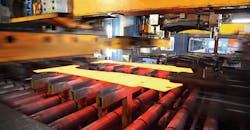Gestamp Automocion SA will be largely insulated from the car industry’s high investment costs to develop electric autos after taking steps years ago to produce the large, lightweight metal parts the vehicles need, Chairman Francisco Riberas said.
Gestamp’s leadership in hot-stamping technology already enables it to supply lower-weight steel body structures and chassis that help automakers grapple with ways to meet tightening emissions rules and develop battery-powered models, Riberas said in an interview. The company’s research is focused on making ever-lighter parts to help both conventional and electric cars use less energy to travel.
"Weight reduction is even more important for electric vehicles, as it’s directly connected to the battery life," Riberas, the 53-year-old son and namesake of Gestamp’s founder, said at the supplier’s Madrid headquarters. "So the shift in the market doesn’t affect our strategy. It actually represents an opportunity for us."
Pushed by stricter air-pollution regulations targeting their fleets, automakers are developing low- or zero-emission vehicles, with investments set to total 40 billion euros ($50 billion) through 2020 in Germany alone. Sales of electric vehicles will grow 40% in 2018 to 1.5 million, with Europe expected to account for about 400,000, according to estimates by Bloomberg New Energy Finance. The change is sweeping across industries, including metal producers and processors.
Gestamp, whose customers include Toyota Motor Corp. and Volvo Car Group, generates 80% of revenue from so-called body-in-white production and chassis. Part-owned by Tokyo-based manufacturing conglomerate Mitsui & Co., the family-controlled Spanish company is seeking a bigger share of several markets such as Japan, which accounted for 7% of the company’s sales but represents 29% of global auto production.
Investors have backed the strategy, with the company’s stock rising 18% since its April 2017 initial public offering, outpacing the 14% increase in the Stoxx Europe 600 Automobiles & Parts Index.
Analysts at Deutsche Bank AG predict most manufacturers will switch to the hot-stamping system eventually, though Riberas said he expects Gestamp to remain in its top role.
"We realized that hot stamping is very powerful and we decided to make that the core of our technology," he said. "Competitors are still working with the original method, not its fourth generation, as we’re doing."
by Rodrigo Orihuela and Thomas Gualtieri
About the Author
Bloomberg
Licensed content from Bloomberg, copyright 2016.

